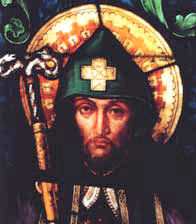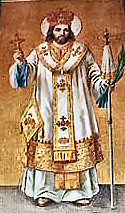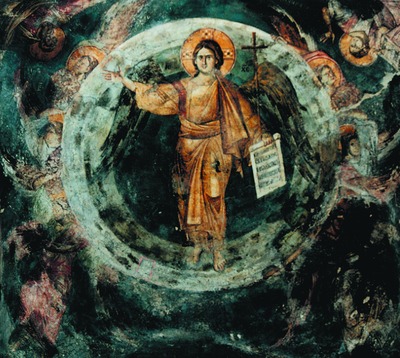1. Then said he to the disciples, It is impossible but that offenses will come: but woe to him through whom they come!
2. It were better for him that a millstone were hanged about his neck, and he cast into the sea than that he should offend one of these little ones.
THEOPHYL. Because the Pharisees were covetous and railed against Christ when He preached poverty, He put to them the parable of the rich man and Lazarus. Afterwards, in speaking with His disciples concerning the Pharisees, He declares them to be men who caused division, and placed obstacles in the divine way. As it follows: Then said he to his disciples, It is impossible but that offenses will come, that is, hindrances to a good life and which is pleasing to God.
CYRIL; Now there are two kinds of offenses, of which the one resist the glory of God, but the other serve only to cause a stumbling-block to the brethren. For the inventions of heresies, and every word that is spoken against the truth, are obstructions to the glory of God. Such offenses however do not seem to be mentioned here, but rather those which occur between friends and brethren, as strifes, slanders, and the like. Therefore He adds afterwards, If your brother trespass against you, rebuke him.
THEOPHYL. Or, He says that there must arise many obstacles to preaching and to the truth, as the Pharisees hindered the preaching of Christ. But some ask, If it needs be that offenses should come, why does our Lord rebuke the author of the offenses? for it follows, But woe to him through when they came. For whatsoever necessity engenders is pardonable, or deserving of pardon. But observe, that necessity itself derives its birth from free-will. For our Lord, seeing how men cling to evil, and put forward nothing good, spoke with reference to the consequence of those things which are seen, that offenses must needs come; just as if a physician, seeing a man using an unwholesome diet, should say, It is impossible but that such a one should be sick. And therefore to him that causes offenses He denounces woe, and threatens punishment, saying, It were better for him that a mill-stone were hanged about his neck, and he cast into the sea, &c.
BEDE; This is spoken according to the custom of the province of Palestine; for among the ancient Jews the punishment of those who were guilty of the greater crimes was that they should be sunk into the deep with a stone tied to them ; and in truth it were better for a guilty man to finish his bodily life by a punishment however barbarous, yet temporal, than for his innocent brother to deserve the eternal death of his soul. Now he who can be offended is rightly called a little one; for he who is great, whatsoever he is witness of; and how great soever his sufferings, swerves not from the faith. As far then as we can without sin, we ought to avoid giving offense to our neighbors. But if an offense is taken at the truth, it is better to let the offense be, than that truth should be abandoned.
CHRYS. But by the punishment of the man who offends, learn the reward of him who saves. For had not the salvation of one soul been of such exceeding care to Christ, he would not threaten with such a punishment the offender.
3. Take heed to yourselves: If your brother trespass against you, rebuke him; and if he repent, forgive him.
4. And if he trespass against you seven times in a day, and seven times in a day turn again to you, saying, I repent; you shall forgive him.
AMBROSE; After the parable of the rich man who is tormented in punishment, Christ added a commandment to give forgiveness to those who turn themselves from their trespasses, lest any one through despair should not be reclaimed from his fault; and hence it is said, Take heed to yourselves.
THEOPHYL. As if He says, Offenses must needs come; but it does not follow that you must perish, if only you be on your guard: as it need not that the sheep should perish when the wolf comes, if the shepherd is watching. And since there are great varieties of offenders, (for some are incurable, some are curable,) He therefore adds, If your brother trespass against you, rebuke him.
AMBROSE; That there might neither be hard-wrung pardon, nor a too easy forgiveness, neither a harsh upbraiding, to dishearten, nor an overlooking of faults, to invite to sin; therefore it is said in another place, Tell him his fault between him and you alone. For better is a friendly correction, than a quarrelsome accusation. The one strikes shame into a man, the other moves his indignation. He who is admonished will more likely be saved, because he fears to he destroyed. For it is well that he who is corrected should believe you to be rather his friend than his enemy. For we have readily give ear to counsel than yield to injury. Fear us a weak preserver of consistency, but shame is an excellent master of duty. For he who fears is restrained, not amended. But He has well said, If he trespass against you. For it is not the same thing to shun against God and to sin against man.
BEDE; But we must mark, that He does not bid us forgive every one who sins, but him only who repents of his sins. For by taking this course we may avoid offenses, hurting no one, correcting the sinner with a righteous zeal, extending the bowels of mercy to the penitent.
THEOPHYL. But some one may well ask, If when I have several times forgiven my brother he again trespass against me, what must I do with him? In answer therefore to this question He adds, And if he trespass against you seven times in a day, and seven times in a day turn again to you, saying, I repent; forgive him.
BEDE; By using the number seven He assigns no bound to the giving of pardon, but commands us either to forgive all sins, or always to forgive the penitent. For by seven the whole of any thing or time is frequently represented.
AMBROSE; Or this number is used because God rested on the seventh day from His works. After the seventh day of the world everlasting rest is promised us, that as the evil works of that world shall then cease, so also may the sharpness of punishment be abated.
5. And the apostles said to the Lord, Increase our faith.
6. And the Lord said, If you had faith as a grain of mustard seed, you might say to this sycamine tree, Be you plucked up by the root, and be you planted in the sea; and it should obey you.
THEOPHYL. The disciples hearing our Lord discoursing of certain arduous duties, such as poverty, and avoiding offenses, entreat Him to increase their faith, that so they might be able to follow poverty, (for nothing so prompts to a life of poverty as faith and hope in the Lord,) and through faith to guard against giving offenses. Therefore it is said, And the Apostles said to the Lord, Increase our faith.
GREG. That is, that the faith which has already been received in its beginning, might go on increasing more and more to perfection.
AUG. We may indeed understand that they asked for the increase of that faith by which men believe in the things which they see not; but there is further signified a faith in things, whereby not with the words only, but the things themselves present, we believe. And this shall be, when the Wisdom of God, by whom all things were made, shall reveal Himself openly to His saints face to face.
THEOPHYL. But our Lord told them that they asked well, and that they ought to believe steadfastly, forasmuch as faith could do many things; and hence it follows, And the Lord; said, you had faith as a grain. of mustard seed, & c. Two mighty acts are here brought together in the same sentence; the transplanting of that which was rooted in the earth, and the planting thereof in the sea, (for what is ever planted in the waves?) by which two things He declares the power of faith.
CHRYS. He mentions the mustard seed, because, though small in size, it is mightier in power than all the others. He implies then that the least part of faith can do great things. But though the Apostles did not transplant the mulberry tree, do not you accuse them; for our Lord said not, You shall transplant, but, You shall be able to transplant. But they did not, because there was no need, seeing that they did greater things. But some one will ask, How does Christ say, that it is the least part of faith which can transplant a mulberry tree or a mountain, whereas Paul says that it is all faith which moves mountains? We must then answer, that the Apostle imputes the moving of mountains to all faith, not as though only the whole of faith could do this, but because this seemed a great thing to carnal men on account of the vastness of the body.
BEDE; Or our Lord here compares perfect faith to a grain of mustard seed, because it is lowly in appearance, but fervid in heart. But mystically by the mulberry tree, (whose fruit and branches are red with a blood-red color,) is represented the Gospel of the cross, which, through the faith of the Apostles being uprooted by the word of preaching from the Jewish nation, in which it was kept as it were in the lineal stock, was removed and planted in the sea of the Gentiles.
AMBROSE; Or this is said because faith keeps out the unclean spirit, especially since the nature of the tree falls in with this meaning. For the fruit of the mulberry is at first white in the blossom, and being formed from thence grows red, and blackens as it gets ripe. The devil also having by transgression fallen from the white flower of the angelic nature and the bright beams of his power, grows terrible in the black odor of sin.
CHRYS. The mulberry may be also compared to the devil, for as by the leaves of the mulberry tree certain worms are fed, so the devil, by the imaginations which proceed from him, is feeding for us a never dying worm; but this mulberry tree faith is able to pluck out of our souls, and plunge it into the deep.
Catena Aurea Luke 17

 Josaphat Kuncewitcz was born about the year 1580 at Vladimir, Volhynia, [part of the Polish province of Lithuania at the time] and given the name John at baptism. While being instructed as a child on the sufferings of our Savior, his heart is said to have been wounded by an arrow from the sacred side of the Crucified. In 1604 he joined the Ukrainian Order of Saint Basil (Basilians), lived as a monk in a very mortified life, went barefoot even in winter, refrained from the use of wine and flesh-meat, and always wore a penitential garb. In 1614 he was appointed archimandrite of Vilna, Russia and four years later archbishop of Polotzk; in this position he worked untiringly for Church reunion. He was a great friend of the poor, once even pledged his archepiscopal omophorion (pallium) to support a poor widow. The foes of union decided to assassinate him. In a sermon, he himself spoke of his death as imminent. When he visited Vitebsk (now in Russia), his enemies attacked his lodging and murdered a number of his companions. Meekly the man of God hastened toward the mob and, full of love, cried, "My children, what are you doing? If you have something against me, see, here I am." With furious cries of "Kill the papist!", they rushed upon him with gun and sword. Josaphat's body was thrown into the river but emerged, surrounded by rays of light, and was recovered. His murderers, when sentenced to death, repented their crime and became Catholics.
Josaphat Kuncewitcz was born about the year 1580 at Vladimir, Volhynia, [part of the Polish province of Lithuania at the time] and given the name John at baptism. While being instructed as a child on the sufferings of our Savior, his heart is said to have been wounded by an arrow from the sacred side of the Crucified. In 1604 he joined the Ukrainian Order of Saint Basil (Basilians), lived as a monk in a very mortified life, went barefoot even in winter, refrained from the use of wine and flesh-meat, and always wore a penitential garb. In 1614 he was appointed archimandrite of Vilna, Russia and four years later archbishop of Polotzk; in this position he worked untiringly for Church reunion. He was a great friend of the poor, once even pledged his archepiscopal omophorion (pallium) to support a poor widow. The foes of union decided to assassinate him. In a sermon, he himself spoke of his death as imminent. When he visited Vitebsk (now in Russia), his enemies attacked his lodging and murdered a number of his companions. Meekly the man of God hastened toward the mob and, full of love, cried, "My children, what are you doing? If you have something against me, see, here I am." With furious cries of "Kill the papist!", they rushed upon him with gun and sword. Josaphat's body was thrown into the river but emerged, surrounded by rays of light, and was recovered. His murderers, when sentenced to death, repented their crime and became Catholics.  Pope Martin I (649-654) was outstanding for virtue and knowledge. He was selected by divine Providence to be the supreme defender of the doctrine that in Christ there are two wills, a divine and a human, against the monothelite teaching of one will, favored at Constantinople. Immediately after ascending the papal throne, he convoked a synod at the Lateran which put the true teaching in its proper light and condemned the opposing error. Emperor Constans II supported the monothelite patriarch of Constantinople and commissioned the Exarch Olympios to assassinate the Pope. The Exarch entrusted the task to a lictor to murder Martin during Mass in the church of St. Mary of the Crib. The lictor could not accomplish the mission because he was suddenly struck blind. From that moment many misfortunes befell the Emperor, but no change in attitude resulted. Instead he sent the Exarch Theodor Kalliopes to Rome with orders to arrest the Pope.
Pope Martin I (649-654) was outstanding for virtue and knowledge. He was selected by divine Providence to be the supreme defender of the doctrine that in Christ there are two wills, a divine and a human, against the monothelite teaching of one will, favored at Constantinople. Immediately after ascending the papal throne, he convoked a synod at the Lateran which put the true teaching in its proper light and condemned the opposing error. Emperor Constans II supported the monothelite patriarch of Constantinople and commissioned the Exarch Olympios to assassinate the Pope. The Exarch entrusted the task to a lictor to murder Martin during Mass in the church of St. Mary of the Crib. The lictor could not accomplish the mission because he was suddenly struck blind. From that moment many misfortunes befell the Emperor, but no change in attitude resulted. Instead he sent the Exarch Theodor Kalliopes to Rome with orders to arrest the Pope. 
